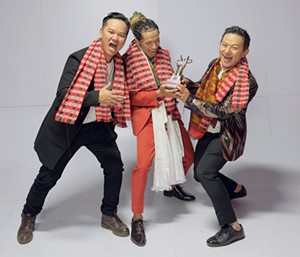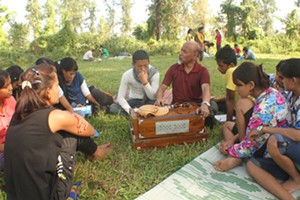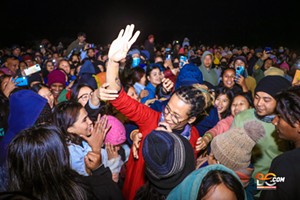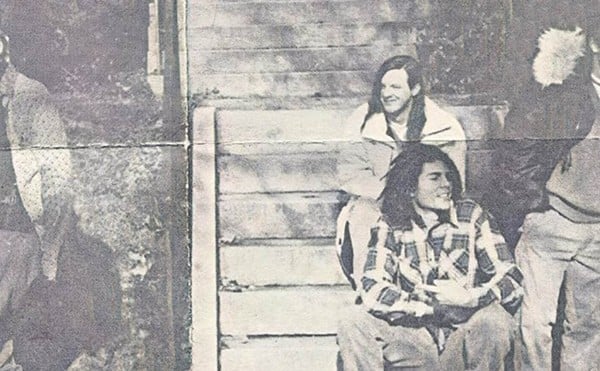Great stories come from strange places sometimes — this time, from a Facebook post asking if someone, anyone, in the media could cover this story. A man from Louisville had won “The Voice of Nepal” Season 4 and, even still, local media had yet to report it.
Winning the singing competition is no small feat. From audition to final sing-off, a lot of time and expense is invested in participating. This story felt perfect from the outset. Local man wins a famous competition. Seems simple enough.
‘I could certainly write something quick about this,’ I thought to myself. So I volunteered.
From the start of my conversation with Karan Rai, it was clear that winning “The Voice of Nepal” was more significant than the accolades he deserved from his success. It was the story of how a hero is made — a classic humble-beginnings epic.
Rai was born in 1994, in the Pathri Morang refugee camp in Eastern Nepal, one of two remaining refugee camps for Bhutanese of Nepali descent who fled ethnic cleansing in Bhutan in the 1980s.. Rai’s family are descendants of Nepalis who went to Bhutan for work. His parents were born in Bhutan, where the speaking or teaching of the Nepali language was under attack. When the conflicts over language and homeland arose, his parents fled Bhutan to the camps.
“The Nepalese people who live in Bhutan, they fought for the freedom of speech because the King of Bhutan…They don’t allow Nepali languages over there,” Rai said. “And then most of the Bhutanese people, they came in Nepal, and then the Nepal government, they don't accept us as Nepali. And then we became a refugee.”
When Karan Rai left the refugee camp, he came to the United States for the chance to live a better life — a life with a country to claim. Now, as he returns to the United States again from his win at “The Voice of Nepal” Season 4, he wants to let others know that wherever you are, your dreams can take you anywhere, even back home on the other side of the world.
“All I want to say is no matter where you come from, where is your background, just focus. Just do one thing. Be passionate about one thing,” he said.
Initially, seven refugee camps were established for refugees fleeing Bhutan when, according to Rai, Nepal refused to extend citizenship to the refugees despite their Nepali heritage. In 1996, just two years after Rai was born, over 100,000 Bhutanese refugees of Nepali descent were living in the camps.
Life in these camps was difficult, Rai says.
“We don't have citizenship there, and then we don't have nothing there. We just had a little house. It's a very tough life over there. We used to get rations weekly, and then sometimes we’d run out of the rations. We got some rice, potatoes and chiles in Nepal.”
As the United States and other countries began opening pathways for the refugees to migrate, the camps were merged. Currently, only two of the camps, Beldangi and Pathri, still exist
Rai came with his family to the United States in 2013, first settling in Seattle, Washington, and later moving to Louisville so that he could expand his education.
As we chat, Rai is preparing for a trip to Australia. Part of his contract with “The Voice of Nepal” is to tour several countries performing concerts and acting as an ambassador for the brand.
Rai decided to audition for the show when he found out that the rules made the contest open to anyone who spoke the Nepali language — including those who had been trapped between two lands that didn’t want them, in refugee camps, left without a country to call home.
“When I was in a camp when I was little, a small — I guess when I was seven, I used to have to sing a song, and then I always wanted to participate in a reality show,” said Rai. “I watched a reality show, most of them, and then I always wanted to go there, but unfortunately, I can't because of my citizenship.”
“I really wanted to go there because I wanted to try,” he continued “Then I saw on Google if you speak the Nepali language, whether you’re living abroad, whether you live in any countries, it doesn't matter. You can participate there. And I was so happy.”
Rai, with a voice that spans hard rock to a delicate falsetto on more traditional Nepali melodies, made his audition tape and sent it to the competition through the website. After producers called to let him know he’d advanced to the next round, he had to travel to Nepal for the “blind audition,” which he passed.
Rai spent seven months in Nepal. After winning the competition in late December, he performed a concert with his coach on “The Voice,” Raju Lama, in his former home at the Pathri Morang camp. Lama is one of the biggest stars in Nepal, and Rai won as part of his team in The Voice competition.
In addition to his obligations for “The Voice of Nepal,” Rai has released an album, The Kites, and the video for his first single, “Changa” in which he worked with Dayahang Rai, a revered star actor in Nepal.
“He's the superstar of Nepal industry at this moment,” Rai said. “I get lucky to play with him in my music video.”
When the competition finished and just before the touring began, Rai returned to Louisville with his trophy in hand. A small group of Nepali and Bhutanese locals gathered at the Louisville Muhammad Ali International Airport to greet him. That evening, he performed in a school gym for a larger crowd from the two nations.
Standing in front of banners, one reading “Nepal-America Society of Kentucky” and the other, “Bhutanese Society of Kentucky,” the image of Rai was striking, as those like him — refugees — and those who bear citizenship in either Bhutan or Nepal welcomed him, as a son of both their nations. Rai, a man who was born without a country, has gained a world where he rightfully belongs.











